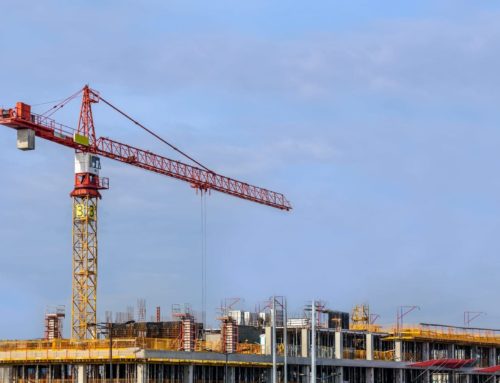In May of this year, the Society of Chartered Surveyors in Ireland (SCSI) released its annual report on the Irish Construction market in association with PWC.
The good news it that confidence appears to have returned to the sector on both a regional and a national level. This can definitely be seen across most Irish towns and cities if the number of cranes dotted across the skyline is a measure. Private housing and commercial construction appears to be leading this increase followed by public sector housing and infrastructure. With the Governments commitment to Project 2040 this level of demand is expected to continue in the coming years.
Irish Construction Cost Inflation
These increased levels of demand coupled with shortages in labour plus the rising costs of materials such as oil, timber and steel have led to sharp rises in the SCSI “Tender Price Index” which reported half year figures of 3.95% and an estimated 7.4% rise in construction costs for the full year. Increased regulation such as the ‘Nearly Zero’ Building Regulations, concerns over Brexit and a possible global trade war would suggest that the pressure on building costs will continue.
This news now means that Irish construction costs are back to pre the credit collapse in 2006/2007, when credit dried up and the property bubble burst sending the Building industry into a deep recession. Whilst admittedly the difficulties faced back in 2007 stemmed from both a combination of Global pressures outside of Ireland’s control alongside more local issues from an over-heating economy, no matter the cause, such continual upward pressure on costs is not sustainable in the long run.
Construction Risks Prevail
The challenges that construction firms and their suppliers now face is how to manage these increases, particularly when so many large scale projects are won on the basis of Fixed-Term Contracts. The lessons of the last recession were hard learnt with an estimated 200,000 construction jobs lost and many projects ending up in Court or complete collapse. The recent collapse of English construction giant Carillion and the subsequent delay in the construction of six new primary schools and local firm Sammon Construction entering liquidation served to bring these risks back into sharp focus.
How Can Construction Companies Reduce The Risks Posed By Increasing Costs?
Whilst entering into any form of construction project involves risk there are a number of steps that prudent construction company directors should consider to ensure their current projects have the best possible chance of completion.
The Government will be tasked with finding ways to cope with a possible trade war and introduce new schemes to drive more innovation, however, it will be up to company directors on the ground to ensure their projects survive.
One of the best places to begin is to talk to the people you tend to interact with most on your projects:
- 1. Talk to Suppliers
Discuss the market and find out from your suppliers where costs are rising fastest. - 2. Talk to other Construction Companies/ Associations
Find out from your contacts in the market and even competitors how they are finding the market. Is there the possibility of pooling resources to gain increased buying power and reduce, or at least, maintain costs? Could industry groups such as the Construction Industry Federation (CIF) help to provide guidance and support? - 3. Talk to Surveyors
Find out where your project may need additional materials and gain an understanding of where costs are expected to rise the most. - 4. Talk to your Accountant
Find out from your accountant what the implications of certain actions may have on your business. Develop best-case and worst-case models for the various scenarios you think may play out. - 5. Talk to your Bank
Is your credit still strong and are your current lenders willing to provide additional support should costs continue to rise quickly? - 6. Talk to your Solicitor
Discuss the options available with your Solicitor so that you have a plan of action prepared in advance and know what to do by when should particular risks come to bear.
In addition to talking to various people in the market to understand your current environment, it would also be prudent to take certain steps now, if you aren’t doing them already.
- 1. Contracts
Re-visit your contracts to understand exactly what you have been contracted to deliver. Are there provisions made for ‘Fluctuations’ to cope with price inflation? - 2. Cash Flow
Review all credit terms and protect cash flow at all costs. Even if this means ringing your debtors on a regular basis to find out why they are 60 days over their terms. - 3. No Credit
Closely related to the previous point, look for debtors using your company as an informal source of credit and find ways to close this down. - 4. Build to Scope
Do not allow any form of scope creep without first receiving agreement in writing and agreement on who will be paying for the new works. - 5. Capital
In addition to the banks, are there alternative sources of investment suitable for your project? - 6. Speed
No matter what issue crops up, try not to let it end in a dispute which leaves your site closed and money burning in the bank. Find quick ways to identify and resolve disputes as quickly as possible.
If you are concerned about the increase in construction costs, the best solution is to act quickly. Talk to those around you; model various best and worst case scenarios; put steps in place sooner rather than later to ensure you aren’t caught by the actions of others; don’t let disputes fester; and create an accurate picture of where your current projects stand versus any new projects you are considering. Having this knowledge will allow you to make informed decisions and if things get tight it will allow you the best possible chance of finishing your current projects and getting out without too much damage to the company.
If you would like to discuss your current construction projects and the legal implications of various decisions you may make, please get in touch to Book An Appointment. Having acted for all sizes of construction company for many years along the length and breadth of Ireland, Clarke Jeffers Solicitors has the necessary business acumen and legal expertise to guide you on the decisions you need to take and the best possible outcome for you and your business. You may also wish to download a copy of our guide, Preventing Your Construction Project From Ending In Dispute.


